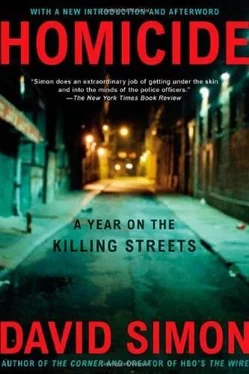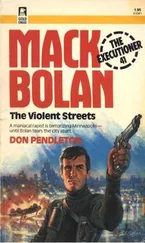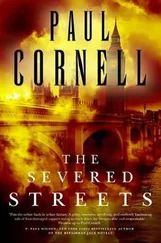Worden nodded, listening carefully. With each additional fact, the senator’s story was becoming both a little more ridiculous and a little more understandable. The ensuing interview with the aide confirmed the scenario that had already taken shape in Worden’s mind. Yes, the aide admitted, the senator had become angry during that discussion in the yard. At one point, he picked up a tree branch and struck the aide across the arm. Then he had fled.
“I guess the argument between you and the senator was over a personal matter,” said Worden, speaking with great care, “one that you would rather keep private.”
“That’s right.”
“And I take it you don’t want to press charges on the assault.”
“No. I don’t want that.”
The two men exchanged glances and a handshake. Worden and James drove back to the office, discussing the alternatives left to them. First option: They could spend days or even weeks investigating an abduction that had never occurred. Second option: They could confront the senator, perhaps with the implied threat of a grand jury investigation or maybe even a charge of false report, yet that would be dangerous because things would get ugly in a hurry. There was a third option, however, and Worden pushed it back and forth in his brain, weighing the risks and benefits. And when the two men and Lieutenant D’Addario were called into the captain’s office for a review of the case, Worden offered the third choice as the most sensible alternative.
If they treated the abduction report as genuine, Worden told the captain, trained homicide detectives would be wasting their days looking for some mystery men in a mystery van that would never be found. If they tried to go to a grand jury, that would be an even bigger waste of government time. A false report charge was penny ante stuff, and who in the homicide unit really wanted to waste his days trying to stick some politician with a misdemeanor, particularly when it wasn’t even clear that the politician had made any official complaint? After all, it was the senator’s doctor friend who made the original call to Deputy Woods; technically, that was reason enough to suggest that there wasn’t any real intent of filing a false report. The third choice was the best, Worden argued, though he had no intention of pursuing that course on his own.
The captain asked how Worden would proceed and what would be said. Worden gave him as clear a picture as possible. The captain then ran Worden’s proposal through once more for clarity and the four men in the room agreed that it made sense. Go ahead, the captain said. Do it.
Worden arrived at Senator Young’s office that same afternoon. He left James back at the office; the younger detective was six years shy of a pension and therefore at greater risk. Instead, Roger Nolan volunteered to go, telling Worden that he might need a witness to whatever occurred. And not only did Nolan have time enough to weather any storm, but, like the senator, he was black. Should anything said in this meeting ever become public, Nolan’s presence might diffuse any issue of race.
At his office downtown, Larry Young welcomed both men and said again that he saw no reason for the police to waste their time investigating the incident. It was a personal matter, the senator explained, and he had every intention of investigating it privately.
Worden seemed to nod in agreement, then offered the senator a review of the investigation thus far. Detectives had failed to locate anyone on McCulloh Street who had seen the abduction, nor had they discovered any physical evidence at the Druid Hill Park site where the senator claimed he had been pushed from the van. The pants that the senator claimed to have worn that night didn’t have so much as a grass stain on them. Likewise, Worden explained, the interview with the senator’s aide and the aide’s parents had raised additional questions. The detective recounted the details of that interview, then gave the senator his out.
“It’s my impression that this is something private between the two of you,” said Worden, “something that you would like to deal with privately.”
“That’s correct,” Young told him.
“Well, if a crime has been committed, then we will investigate it fully,” Worden said. “But if no crime was committed, then that puts an end to it.”
The senator took the offer for what it was, but asked a few questions to be sure. If he told them that no crime had occurred, that would end the investigation, correct? And if he told them here and now that there was no crime, that admission would not be used against him, correct?
“Not by me,” Worden told him.
“Then,” the senator replied, “there was no abduction. I would prefer that the matter be dealt with privately.”
Worden told the senator that he could regard the police department’s investigation as a closed file. The original abduction report had been written up as a police-information-only report, as was the case with all threat cases involving public officials. And because there is no incident report, there should be nothing in the newspapers.
“Our part in this is over,” Worden said.
Worden and Nolan shook hands with the senator, concluding the bargain. There would be no grand jury probe, no red-ball moneymaker for which a squad of homicide detectives could clock overtime, no awkward questions about the senator’s private life, no public revelations about a politician’s bungled attempt to fabricate a counterweight to his own assault and battery. Instead, the homicide unit would go back to the more parochial task of working murders. Worden returned to headquarters and typed the requisite report of the meeting for the captain, believing he had done the right thing.
But on June 14, a week and a half after his journey to the senator’s office, Worden’s quiet solution to the whole sordid affair was shattered by a news leak of the incident to a television reporter for the local CBS affiliate. From the amount of information about the case in the reporter’s broadcast, Worden and James both suspected that the leak had come from within the department. That scenario made sense; not everyone in the chain of command could be considered the senator’s political ally and the bizarre abduction report made for a pretty embarrassing picture.
Of course, once the confidential information was revealed, police officials and prosecutors alike were suddenly tripping over one another in an attempt to avoid the appearance of covert deals and cover-ups. Confronted by the reporter, the mayor himself got into the act, ordering the department to make public its incident report for the original abduction complaint. With the press suddenly baying outside City Hall, the original priorities were all immediately inverted. A week earlier, the brass had been content to have Worden end the probe of a nonexistent crime with some discretion, allowing the homicide detectives to return to their primary responsibilities; now, these same bosses were being asked in public why an influential West Baltimore senator who had admitted to making a false report had not himself been charged. Was some sort of deal cut? Was the incident kept secret to protect the senator? What kind of influence was used on behalf of the senator?
A steady deluge of newspaper headlines and TV broadcasts prompted city officials to begin a full review by the state’s attorney’s office, followed by a grand jury investigation. For the next week, there were meetings between prosecutors and police officials, followed by more meetings between prosecutors and an influential trial attorney retained by the senator. One particular afternoon, when Worden and James were leaving a meeting between prosecutors and the senator’s attorney at a private law office, they walked out of the building only to be confronted by the same television reporter who had been leaked the story.
Читать дальше












